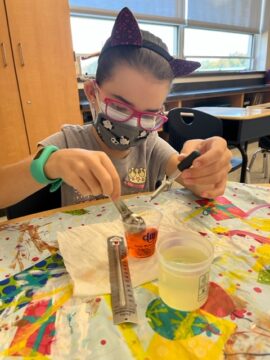Students conduct experiments for National Chemistry Week

A second grade student at Keystone Elementary School experiments with food coloring and bleach.
Grade 2-5 students in the Elementary Gifted Program explored chemical reactions in the “Disappearing Color” lesson created by the American Association of Chemistry Teachers. Students first learned what a chemical change is and the two indicators of a change: temperature and color, and learned about safety when handling chemicals and the importance of safety glasses. For the first experiment, students started with a container filled with water and added one drop of color to the water. After taking the water’s temperature, students used an eye dropper to add bits of bleach until the water became colorless. Students took the temperature of the water again and discovered it became about a degree colder.
The second experiment focused on time and supported the National Chemistry Week theme, “Fast or Slow…Chemistry Makes It Go!” Students put one more drop of any color in the bleach and timed it to see how long the drop took to become colorless. After measuring the time, students compared their results. They found that each color took a different amount of time, with yellow becoming colorless quickly and red taking minutes longer.
“Through this lesson students became mindful of what chemical changes can be and how they connect to the real world,” said Christine Schrack, elementary teacher of gifted and talented students in BTSD. Students discussed chemical reactions that occur in daily life such as frying an egg and how the temperature change turns the egg into something new that can be eaten, or how fireworks are created from powder. “I was impressed with how our young learners grasped the lesson and understood the concept of a chemical change,” said Schrack. “They were very intentional in their work and cautious handling the materials.”

